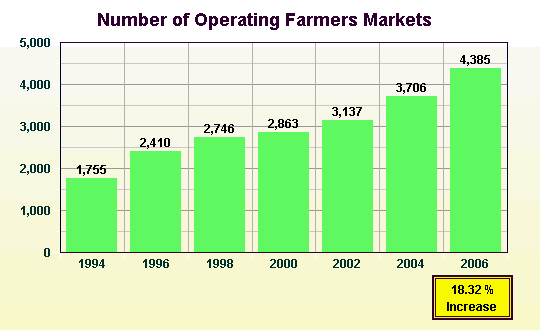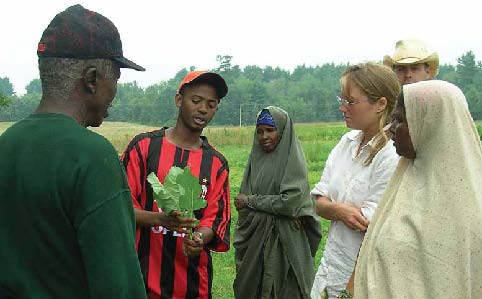Refugee Farm Projects
Refugee farm training projects can be thought of as refugee garden projects with national and global agendas. Federally-funded programs that emerged in the late 90s and early 2000s, refugee farms projects are part of the local food movement, which is in turn part of the alternative food system movement or “sustainable” food system movement.
The “sustainable” food system is a production, distribution, and consumption ideal descended from the natural foods movement of the 60s and 70s. Since 1962, when Rachel Carson reported the harmful effects of pesticides in her book, Silent Spring, a minority of consumers have continuously supported a non-industrial food market. Though the alternative food movement was originally born out of environmental concern, contemporary supporters advocate for larger issues of social justice.<1>
In the last two decades, consumer demand for organic and locally grown food products has exploded. Over the last ten years $1,250 new farmers markets have opened in the U.S.<2>
 |
Graph from USDA |
Refugee farm training projects aim to capitalize on this booming market. The U.S. Department of Agriculture’s Risk Management Agency (USDA-RMA) and the Office of Refugee Resettlement (ORR) jointly fund the Rural Initiative, which funds programs that train refugees and other low-income individuals to become farm entrepreneurs.<3>
"Refugees are portraits of hope, determination and courage seeking a better life for themselves and their families. To help refugees and others to use their skills in the United States, they need information about the risks and opportunities they may encounter producing specialty crops. This initiative will leverage the ongoing efforts by the federal government and other community organizations to provide educational outreach that will help these producers establish successful operations."
—Eldon Gould, USDA-RMA Administrator<4>
Supported by such funds and other advocates, including Heifer International, refugee and immigrant farm projects have been launched in cities across the U.S. While web-researching case studies, I discovered that such projects have been launched in California, Texas, Oregon, Minnesota, Wisconsin, Nebraska, Kansas, New York, Rhode Island, Massachusetts, Maine, Pennsylvania, and Florida. These projects aim to:
Revive the U.S. small farm economy
Help refugees and immigrants start or expand agricultural enterprises
 |
Farmers in the New American Sustainable Agriculture Project Image source: Heifer International |
=====
<1> Jack Kloppenburg, Jr., Sharon Lezberg, Kathryn De Master, G. W. Stevenson, and John Hendrickson, “Tasting Food, Tasting Sustainability: Defining the Attributes of an Alternative Food System With Competent, Ordinary People,” Human Organization 59 (July), 177-186, http://www.cias.wisc.edu/foodshed/pubsntools/tasting.htm (accessed December 8, 2007)
<3> “RMA Announces Rural Initiative for New American Farmers,” United States Department of Agriculture Risk Management Agency, June 20, 2006, http://www.rma.usda.gov/news/2006/06/newamericans.html (accessed December 8, 2007)
<4> Ibid.